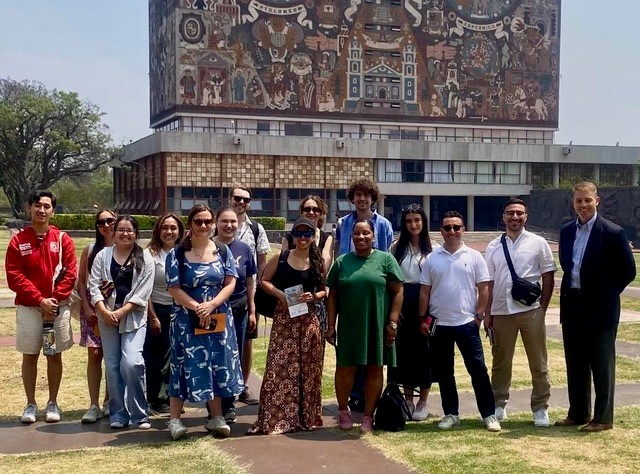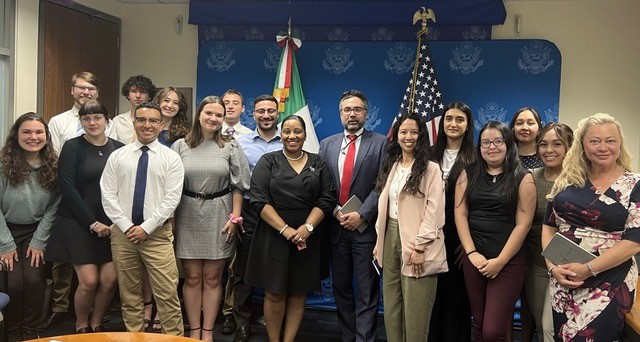In This Story

You could feel the weight of geopolitics in the air as 15 George Mason University students stepped onto the worn stone of the Plaza of Three Cultures, where centuries of conquest, revolution, and resilience converge. The students weren’t just tourists with backpacks and bottled water. They were emissaries of inquiry—and there would be a quiz.
Over a weeklong intensive in Mexico’s bustling capital, the students—most from George Mason’s Schar School of Policy and Government—immersed themselves in the multifaceted knot of issues that define United States-Mexico relations. The students were eager to see firsthand elements of theory learned in classrooms: Migration, trade, national security, and the still-rippling effects of a second Trump administration.
“Throughout the program, students were encouraged to approach the experience not merely as observers but as engaged policy analysts,” said Derek M. Mills, the Schar School adjunct professor who led the trip. “The course, U.S.-Mexico Relations in the Age of Trump, provided an experiential lens into the historical, political, and economic complexities shaping bilateral ties.”
The group took deep dives into policy briefings with diplomats at the U.S. Embassy and with business leaders at the American Chamber of Commerce. They sat in on discussions at the Mexican Federal Congress and exchanged ideas with their counterparts at the prestigious Universidad Nacional Autónoma de México (UNAM).
They weren’t just studying policy. They were living it.
A highlight was meeting Schar School alum Jose Loyola-Trujillo, who earned his PhD in public policy in 2005. Loyola, once Mexico’s undersecretary of energy, is now head of international affairs for LIGA MX—the top-flight Mexican soccer league.
Students also visited Casa de los Amigos, a migrant shelter that pulls no punches in portraying the human cost of border enforcement.
Another stop took the students to a nonprofit dedicated to empowering marginalized, refugee, and forcibly displaced people and families by means of a range of support programs. In fact, meeting the staff at New Comienzos “and hearing from returning migrants was inspiring to see how resilient they are and how that connects to the deep ties between Mexico and the United States,” said Jackie Tuala, a master’s student in public administration. “It was my favorite visit.”
There were lessons in history and humanity at every turn—from the pyramids of Teotihuacan to the testimonies of deportees. But there was also room for forward-looking policy dialogue.
In Cuernavaca, south of Mexico City, the group met with the Secretary of Tourism Josefina Rodriguez Zamora, who didn’t mince words about how U.S. political rhetoric affects Mexico’s global image. When U.S. media parrots terms like “rapists” and “murderers,” the official said, the damage isn’t abstract—it costs Mexico tourist dollars, jobs, and dignity.
Students also toured AirDesign and FloraPlant—two export-focused companies where the granular details of tariffs, supply chains, and sustainability initiatives became tangible.
“The trip brought the issues we study in class to life. I loved how everything—from policy debates to cultural sites—was tied together,” said Stella Lovelady, a master’s student at George Mason’s Jimmy and Rosalynn Carter School for Peace and Conflict Resolution.
As the Trump administration 2.0 begins to cast long shadows over cross-border cooperation, the students came away with a clearer, more nuanced perspective, as well as a deeper sense of responsibility.
“Experience is crucial to our students’ professional development as future public, private, and nonprofit leaders,” said Michal McElwain Malur, Schar School’s external program director, who accompanied the students for the week.
“By engaging directly with these issues on the ground, they build the kind of informed, empathetic understanding that will shape them into thoughtful leaders in our increasingly interconnected world,” she said.
Study abroad is a vital and highly recommended component of a Schar School education. Questions on future classes can be directed to McElwain Malur at mmcelwai@gmu.eduand be found on the Schar School of Policy and Government Study Abroad page.

